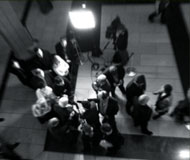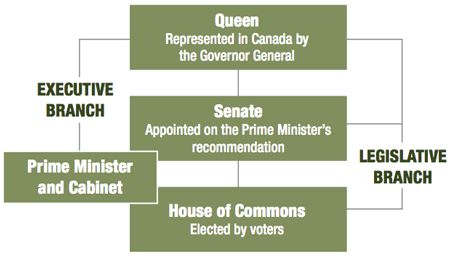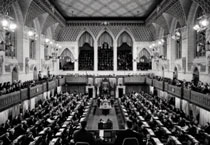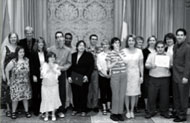At Work in the House of Commons
The work of Canada's House of Commons adheres to a calendar that runs most years from late September through mid-June, with breaks to permit parliamentarians to work in their regions or ridings, or travel on official business. Meetings of the House of Commons are called sittings. These are grouped together into larger units known as sessions.
Featured prominently at the start of a new session is the Speech from the Throne, which is read by the Governor General. This is an important speech that establishes the government's agenda for that session of Parliament. A session ends when it is prorogued. It also ends when a Parliament is dissolved, in which case a general election is held and Canadians elect representatives to a new Parliament.
Role of the Speaker

The Speaker reading the prayer at the beginning of a sitting with two pages at his side.
Photo: © House of Commons / Chris Diotte
The Speaker of the House of Commons maintains order and decorum in the Chamber and is responsible for ensuring that all Members respect the rules and practices of the House. Elected in a secret ballot by Members, the Speaker presides over Chamber proceedings and is also Chair of the Board of Internal Economy, overseeing the administration of the House. In addition, the Speaker is the spokesperson and the formal representative of the House when conducting business outside the House of Commons with the Senate, the Crown and other bodies at the national or international levels.
At the beginning of the 39th Parliament, the Hon. Peter Milliken was elected to serve as Speaker for the third consecutive time. Speaker Milliken is a member of the Official Opposition, but as Speaker he does not attend caucus meetings.
Following prorogation of the First Session of the 39th Parliament on September 14, 2007, the Second Session began on October 16, 2007. The Speaker and Deputy Speaker, the Hon. Bill Blaikie, continued in their positions and the other presiding officers, Mr. Royal Galipeau, Deputy Chair of Committees of the Whole and Mr. Andrew Scheer, Assistant Deputy Chair of Committees of the Whole, were re-elected by motions adopted in the House.
The Clerk, as the senior permanent official of the House and chief executive of the House Administration, advises and supports the Speaker and other chair occupants, the House and its committees in all procedural and administrative matters. The Clerk also keeps the official record of proceedings.
Making Laws
THE PARLIAMENTARY PRESS GALLERY

Journalists gathering in the House of Commons foyer to speak to Members after Question Period.
Photo: © House of Commons / bernard thibodeau
The interaction of Members with the media is an essential component in maintaining the transparency and accountability of Canada's democratic institutions. It is generally through the Parliamentary Press Gallery that this interaction takes place. This is a group of journalists assigned by media organizations to cover parliamentary events. In addition to undertaking independent research and investigations, Press Gallery members observe legislative debates and votes, interview political figures and attend press conferences and media scrums.
Lawmaking is one of the most important functions of the House of Commons. Every piece of federal legislation first starts out as a bill, which is a proposal either to create a new law or to amend existing ones. A bill must be approved by the Senate and the House of Commons and receive Royal Assent before it becomes law. The time required to pass a bill can vary depending upon urgency, complexity and the degree of consensus among Members of the Senate and the House of Commons.
There are two main types of bills: public and private. Generally, public bills concern matters of public policy, such as finance or national security, while private bills, which are very rare, deal with private interests. Public bills can be divided into government bills, that is, those sponsored by the government and introduced by a Cabinet Minister, and Private Member's bills, sponsored by a Member who is not a Minister or a Parliamentary Secretary.
While some bills can be introduced in the Senate, all those that involve raising or spending public funds (known as money bills) must be introduced in the House of Commons.
Over the past fiscal year, 61 government bills were introduced in the House of Commons. These bills covered a range of social, economic and political issues, including:
- consultations with electors on their preferences for appointments to the Senate
- youth crime
- protection of the environment
- financial assistance for students
- development of Canada's seacoast and inland fisheries
- family homes situated on First Nation reserves.
Canada's Parliamentary System

From April 1, 2007 to March 31, 2008, 106 Private Members' public bills were introduced in the House of Commons. These bills focused on a wide range of issues, including:
- chemical pesticides for non-essential purposes
- sponsorship of relatives for immigration to Canada
- proposition for a Flag Day
- automated banking machine charges
- trafficking of human organs
- labelling of food products.
LEGISLATIVE STATISTICS FOR 2007-2008
Government bills introduced: 61
Private Members' public bills introduced: 106
A key component of the legislative process is that Members of Parliament have many opportunities to propose amendments to bills under consideration. In the period covered by this report, Members submitted over 680 motions in amendment at committee and report stages.
Question Period, Motions and Debates
A key function of the House of Commons is providing a forum for questioning the government about its actions and policies. Members of Parliament ask questions during Question Period, which takes place for 45 minutes on each sitting day. Members, primarily of the opposition parties, can ask questions of the Prime Minister and Cabinet Ministers on matters within the administrative responsibilities of the government.
When detailed, lengthy or technical information is sought from the government, questions can be submitted in writing. The government's replies are subsequently tabled in the House of Commons.
There were 4,242 oral questions asked and 349 written questions submitted in the past year.
Opposition parties can also raise issues of concern by selecting topics for the House to debate on allotted days. These days are known as opposition or supply days. In each calendar year, 22 days are set aside for consideration of these motions sponsored by Members of opposition parties. The allotted days are allocated on the basis of party representation and after consultations among opposition parties. During the past year, Members discussed a variety of issues of public concern on allotted days, including Canada's mission in Afghanistan, climate change and the Kyoto Accord, as well as equalization payments and immigration.
Tabling Documents

Members in the House of Commons, 39th Parliament.
Photo: © Library of Parliament / Roy Grogan
In the House of Commons, tabling a document is a formal way of presenting information and making it a matter of official public record. Documents typically tabled include annual reports of various departments and agencies, documents concerning non-judicial Order-in-Council appointments, government responses to committee reports and other papers concerning matters related to the administrative responsibilities of the government (e.g., treaties with other countries). Collectively, these documents, along with others such as petitions and committee reports, are called sessional papers.
In 2007-2008, there were 1,743 sessional papers tabled in the House of Commons.
Following the Rules
OUTREACH PROFILE
Buddies Program
The Buddies Program is a cooperative venture between Ottawa's Ridgemont High School and the House of Commons, offering students with disabilities the opportunity to acquire the skills that will help them find work in the future. The program runs throughout the school year and consists of one or two half-days a week. Participants in the program are involved in a range of special projects. Security Services also calls on the Buddies Program to help assemble their security booklet.

Volunteers of the Program with participants and the Clerk.
Photo: © House of Commons
OUTREACH PROFILE
Citizens Addressing House of Commons Committees
Citizens can address Parliament as witnesses at committee meetings. Most witnesses are public servants, experts in a particular field, or representatives of groups and organizations. Private individuals, however, can also be witnesses. All serve to help Members better understand the topics they are studying and to provide suggestions on how to improve policy and legislation. Committees advertise their hearings on the Parliament of Canada Web site. Anyone interested in submitting a brief or making an appearance can contact the clerk of the committee they wish to address. For more information, visit the Parliament of Canada Web site (www.parl.gc.ca).
The daily activities in the Chamber are governed by a set of written rules known as the Standing Orders and by a body of practices and traditions. The House of Commons continues to develop and modify its rules and practices. In 2007-2008, amendments were made to the Conflict of Interest Code for Members of the House of Commons, which forms part of the Standing Orders and addresses a variety of issues, including rules of conduct (i.e., expanding the definition of parliamentary business covered by the Code and clarifying the limitations on Members' activities), as well as contracting and the Members' disclosure statements.
House practice evolves in part through decisions by the Speaker called "rulings". These rulings involve the Speaker's interpretation of the rules and precedents of the House. In some cases, the Speaker delivers these rulings immediately from the chair when a point of order is raised by a Member. In others, the Speaker states that he will "take the matter under advisement". This means that a more in-depth examination of the facts is required so a written ruling is prepared after a review of past practices and precedents.
In the period of this report, the Speaker delivered 29 major rulings, which dealt with such questions as:
- obstruction of a Member
- the intimidation of committee witnesses
- premature disclosure of the Throne Speech
- the use of unparliamentary language in the Chamber
- violations of the financial prerogatives of the Crown
- the admissibility of bills and motions.
As well, for the first time since 1913, the Speaker was required by the House to issue a warrant, in this case to have Mr. Karlheinz Schreiber transferred from detention in Toronto to Ottawa so that he could appear as a witness before the Standing Committee on Access to Information, Privacy and Ethics.
FIND YOUR MEMBER OF PARLIAMENT
You can find your Member of Parliament either by entering your postal code on the main page of the Parliament of Canada Web site at www.parl.gc.ca, or by using the fold-out insert located in the centre of this report.



